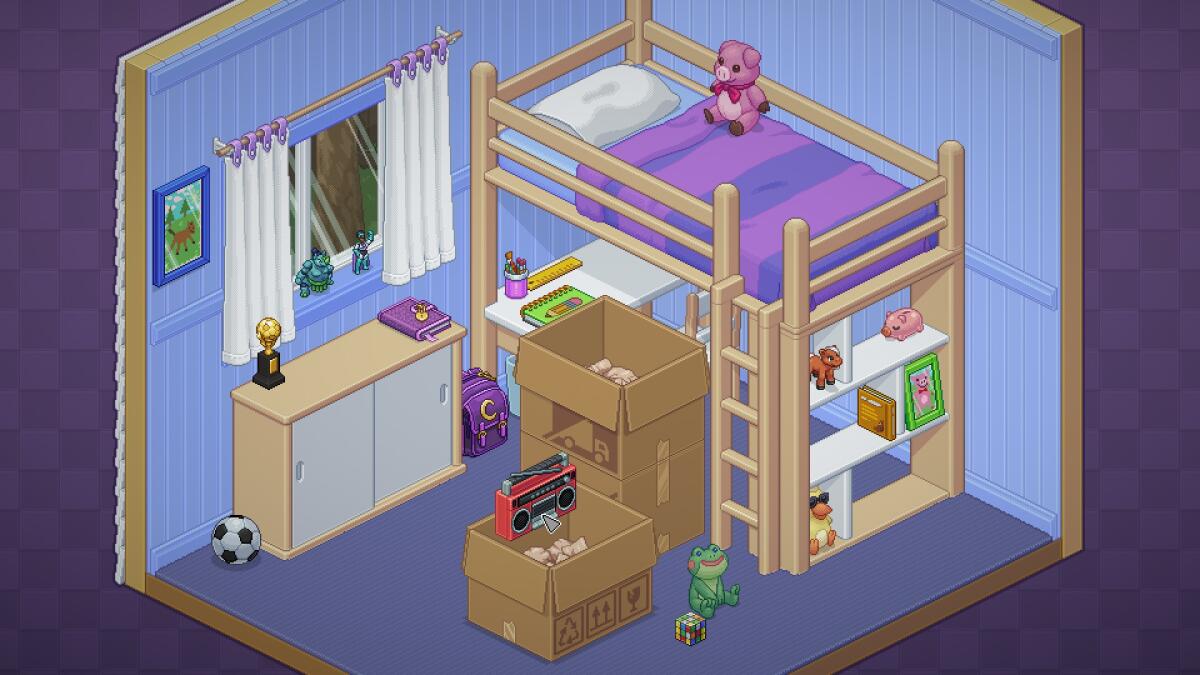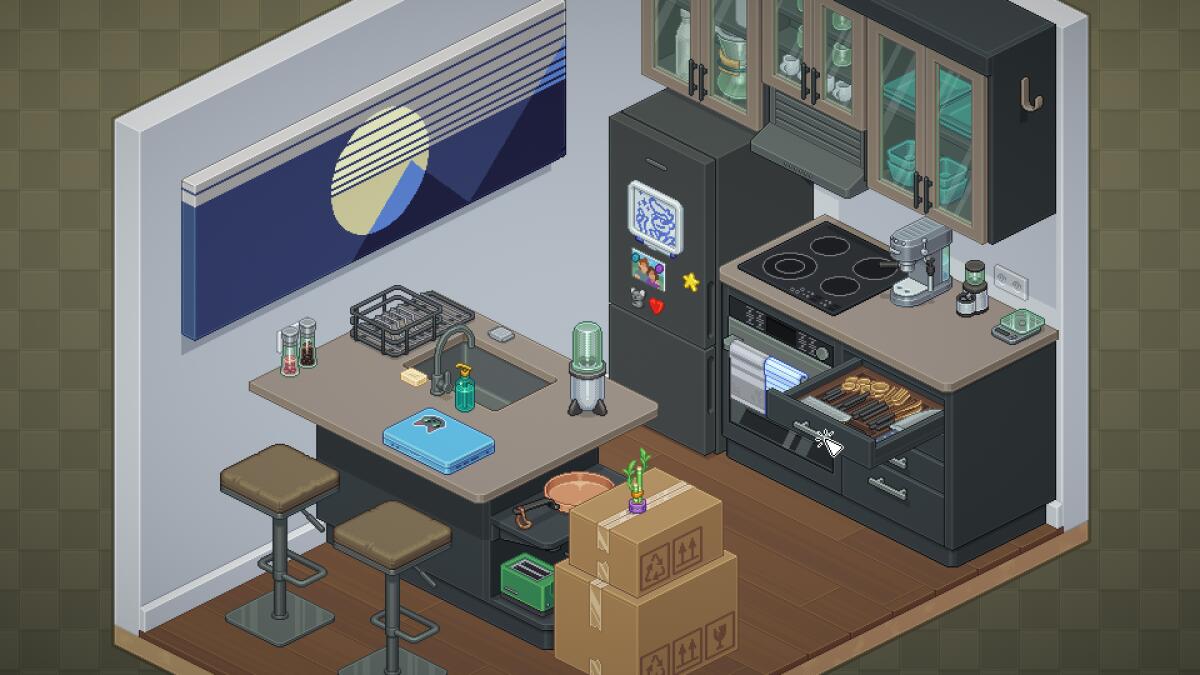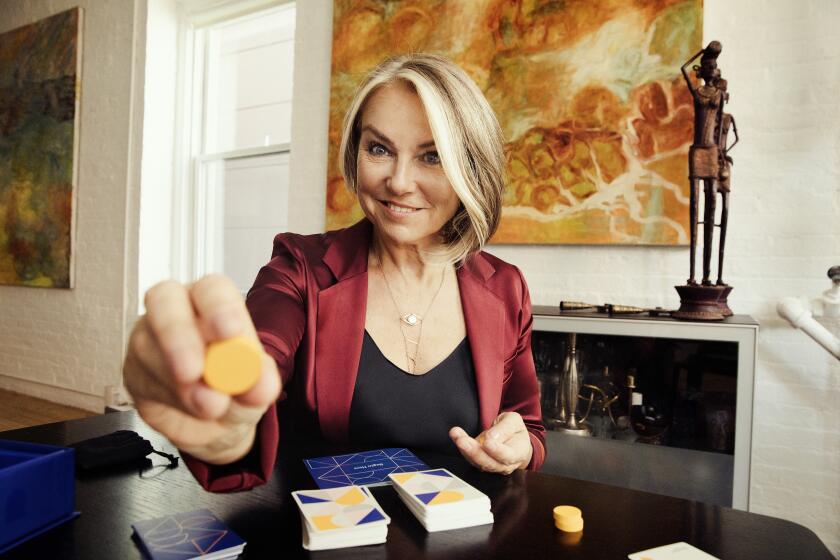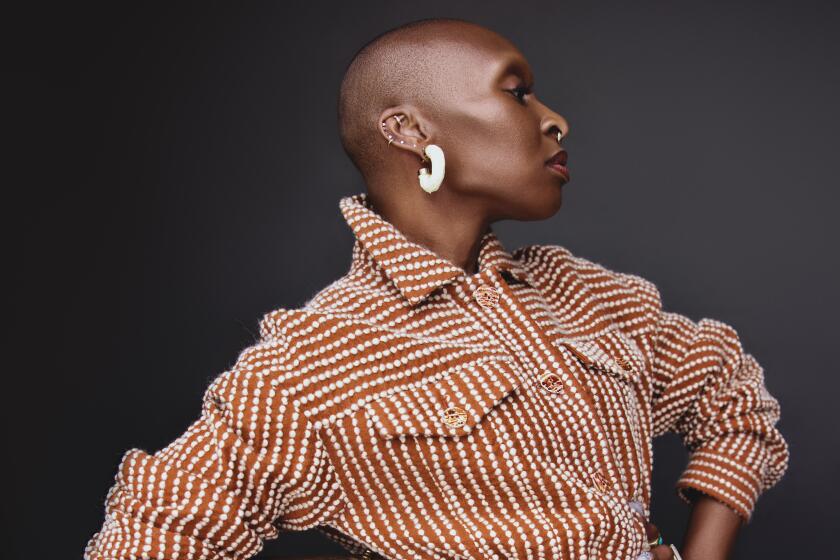Fall in love with ‘Unpacking,’ a beautiful, simple story of how we live told via what we own

- Share via
As I write this in my home office, which in these late-pandemic, work-from-home days is simply my bed, I can look at the nightstand on the left and see on one of its open-slotted shelves a giant bumblebee.
Its head has been sewn on at least twice, and it used to make a bell-like noise. It was one of the first plushies I remember having as a kid, and it moved with me through the years, only today it’s not for cuddling — it’s on display.
In the nightstand on my right is a rarely opened drawer filled with personal trinkets of the melancholic nostalgic sort, such as a pack of tarot cards left recently by someone dear to me as well as the photo booth pictures we took one night when I failed to look at the camera. I like to keep some of those items close but out of sight, their presence somewhat ghostly.
They’re the spirits of close friends, past partners or departed family members — mementos from those who touched my life and don’t deserve to be forgotten, even if they are still a part of my life. Then there’s the closet in front of me. That’s a bit of a mess these days, so we’re going to skip it, since I know its disorganization is a metaphorical representation of how throughout 2021 I’ve let my own self-care slip a bit.
An interview with Esther Perel — the psychotherapist behind the popular podcast “Where Should We Begin?” and now a game developer — turns into a therapy session.
There’s a lot to unpack when it comes to the stories, the emotions and memories contained in the items we own and continue to hold onto. If we’ve saved something, there’s likely some meaning to it. And while I’m far from a hoarder, I understand the temptation to never let go of that high school love letter or pack of tarot cards, which can only truly have meaning when in the presence of the person who brought them into my world.
We’re constantly building the story of our lives, an evolving narrative that we live among and inside.
This theme is explored in “Unpacking,” a beautifully restrained and relaxing game that on the surface is about the puzzle of organization. Yet it stealthily has broader ambitions. The game, from Australian developer Witch Beam and available now for the Nintendo Switch, Xbox consoles and home computers, is peaceful in tone but deeply thoughtful in its presentation. “Unpacking” is ultimately a story about growing up, with life’s changes told through the items we own, the items we acquire and the ones we forever hold onto but keep just out of sight.

What makes it such a lovely game — and a prime example of the sort of environmental-focused storytelling that games do so well — is that we never meet any human characters. We get a glimpse of passions — art, painting, reading, video game playing — and some hints at fears, such as the moment our unseen protagonist writes that it feels like a big step to move in with a significant other. Given just brief nods at her thoughts and writings, we gradually come to view her possessions with the love and care that she has for them.
Consider it a “Tetris” or the more recent and apt example of “Wilmot’s Warehouse,” but one that truly wants us to think about big life moments rather than just neatly organize items. There are a few aha instances that let us deeper into the mind of the character whose life we’re assigning order, and they’re such a delight that I won’t fully spoil any here.
But as a broad example, mid-game I was asked what to do with a picture — hang it, tack it, hide it — and while a relatively small choice by game standards, the solution was one I not only wanted to sit with but it inspired me to start opening some old boxes. “Unpacking” sent me on my quest of reminiscence.
For this isn’t so much a game about putting things away as it is one of constant discovery. We can read between the lines, for instance, when we move in with someone else and see their hobbies become ours, only a few years later to be asked to put those items behind closed doors.
With “Arcane,” its in house-produced animated show for Netlflix, Riot aims to put games at the center of the entertainment universe.
It’s video game storytelling at its most approachable, letting us linger with images that are easily identifiable but just imprecise enough to be universal. We start in 1997 and gradually work our way closer to present day, beginning with a young child’s first solo room and seeing the starts and sputters along the way of building a life. “Unpacking” should be self-explanatory to even those not deeply experienced in games; we click a box, and then click it again to get an item and then place said item somewhere in one of the rooms.
Each room, apartment or house lives in a photo album, allowing us to revisit and rearrange past parts of a life. It’s worth the effort. I continually uncovered new interactions, such as how taking photos in different places of the home leads to different memories on the part of our unseen character, or toying with someone else’s stuff when we learned a certain relationship didn’t go the way it was hoped. Those socks and underwear? Let’s see if I can get away with leaving them on the floor.
While “Unpacking” has an uplifting, positive tone that leads to an optimistic ending, there were times the game slightly devastated me, such as when, for instance, art that was once on display had to be shoved under a bed. Don’t worry, the images find a way to breathe again, but there’s joy in living in a world instead of having a story linearly told to us in such a universe. The world gradually becomes ours.
I sense “Unpacking” will feel personal to everyone who plays it. It asks us to think not just about how we live but with whom our choices and our passions are compatible, one work of art or childhood plushie at a time.
Unpacking
It turns out games are uniquely tailored to explore love, romance and heartbreak. Consider “Maquette,” “Genesis Noir” and “Journey of the Broken Circle,” interactive conversations that ask players to think about love.
More to Read
The biggest entertainment stories
Get our big stories about Hollywood, film, television, music, arts, culture and more right in your inbox as soon as they publish.
You may occasionally receive promotional content from the Los Angeles Times.













